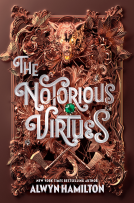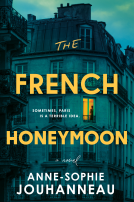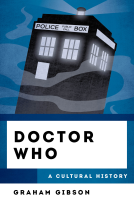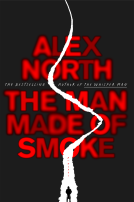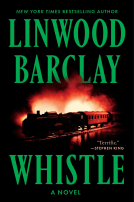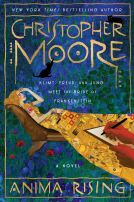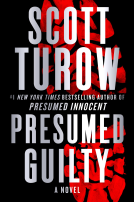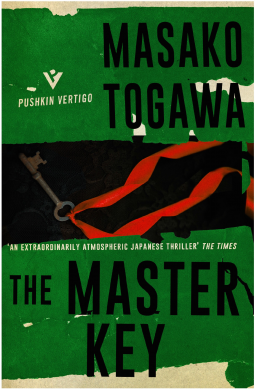
The Master Key
by Masako Togawa
This title was previously available on NetGalley and is now archived.
Send NetGalley books directly to your Kindle or Kindle app
1
To read on a Kindle or Kindle app, please add kindle@netgalley.com as an approved email address to receive files in your Amazon account. Click here for step-by-step instructions.
2
Also find your Kindle email address within your Amazon account, and enter it here.
Pub Date Mar 27 2018 | Archive Date Nov 26 2017
Pushkin Press | Pushkin Vertigo
Talking about this book? Use #TheMasterKey #NetGalley. More hashtag tips!
Description
The K Apartments for Ladies are occupied by over one hundred unmarried women, once young and lively, now grown and old—and in some cases, evil.
Their residence conceals a secret connecting the unsolved 1951 kidnapping of four-year-old George Kraft to the clandestine burial of a child's body in the basement bath-house. So, when news comes that the building must be moved to make way for a road-building project, more than one tenant waits with apprehension for the grisly revelation that will follow. Then the master key is lost, stolen and re-stolen—and suddenly no-one feels safe.
Fiendish intrigue, double identity and an ingenious plot make this a thriller worthy of comparison with the work of P.D. James.
Advance Praise
"Fans of P.D. James, Robert Barnard and other literate writers in the genre will welcome this prize-winning author's first work... Superbly crafted and riveting from start to finish." — Kirkus Reviews
"Extraordinarily atmospheric Japanese thriller ... Miss Togawa writes with economy, subtlety and an astonishing feel for time, mood, and the eccentricities of loneliness. An eerie gem." — Marcel Berlins, The Times
"As fascinating a weird yarn of mystery as you'll find... One word sums it up - superb!" — LA Times
"Starts out on a high note of tension and stays that way up until the very end."— Crime Segments
"A clever, creepy story." — Mail on Sunday
"The PD James of Japan." — Times Literary Supplement
Available Editions
| EDITION | Other Format |
| ISBN | 9781782273639 |
| PRICE | $13.95 (USD) |
| PAGES | 192 |
Featured Reviews
 Susan R, Reviewer
Susan R, Reviewer
This novel was first published in 1962 and is one of the new Pushkin Vertigo re-issues, which re-print international crime classics. “The Master Key,” is set in an apartment block for single women, called ‘The K Apartments,’ in 1951. The whole building is about to be lifted, and moved four metres, in order to enable the widening of the room. This dark, unusual story, is built around this event and goes backwards in time, introducing us to all of the characters and the possibility that the builders will unearth the many secrets of the apartment inhabitants.
Secrets, there certainly are. From the burial of a child’s body (this occurs virtually in the first scene, so isn’t a spoiler), a popular religious cult, a woman who hordes rubbish and lives within a cupboard, the lonely, lost and dysfunctional. All of these women, now mostly elderly and retired, who endeavour to fill their days; while within the building the pass key – the master key which opens all of the apartments – is lost and means that nobody is truly safe from prying eyes. This really is a very creepy read. I really do enjoy the Pushkin Vertigo series and have discovered some very unusual authors through this imprint. I received a copy of this book from the publisher, via NetGalley, for review.
 Kirsty L, Reviewer
Kirsty L, Reviewer
This was a strange, surprising delight. It's set in a Japanese apartment complex/boarding house for unmarried women. The entire building is going to be picked up and moved to make way for a new road – the residents are assured that they will barely notice it moving, so much so that they could put a glass of water on the table and it won't spill. The fact that just about all of them DO put a glass of water on the table and then stare it it shows you how deeply unexciting their lives are. However, there is a dead child buried beneath the building, and soon all will be revealed.
My favourite part of this book was the characters – they're so brilliantly drawn, and so strange. Each has her own history and quirks, all of which come to light after the theft of a master key which unlocks any apartment door. One woman, a professor, obsessively copies out her late husband's research papers, even though they're gibberish. A hoarder digs through the kitchen bins to steal fish heads to stave off the calcium deficiency she falsely believes she has. A failed violinist tells a child that her paralysed middle finger is caused by witchcraft. As the women's stories unfold, the sense of loneliness, regret and claustrophobia builds. Also, Simon Grove's translation is great – the prose flows beautifully, and I was hooked from the start.
If you're used to a more immediate, formulaic crime novel then this might feel strange initially, but if you're looking for a more offbeat mystery then I'd recommend this.
 Siti J, Reviewer
Siti J, Reviewer
The book started off very well. It was intriguing and pique your interest immediately. You are enthralled by the mystery of the lone woman who waited for 7 years for her companion. And this introduction was a perfect setting for the mysteries and secrets of the residents of the K Apartment .it was a strange story, but the characters were very interesting, with double identities that was very well hidden. There is a great ambience of regret and loneliness that touches your heart. I’ve greatly enjoyed reading this book. It’s easy and pleasant to read. I would recommend it to my friends.
 Andrew B, Reviewer
Andrew B, Reviewer
The Master Key is a fascinating read that defies easy categorization. The cover of this Pushkin Vertigo reissue features a quote from a review in The Times that describes it as an ‘atmospheric Japanese Thriller’ yet while it has suspenseful moments, I think that gives a slightly inaccurate impression of what the book will be like.
Instead I think the book is best described as a series of puzzles and revelations that the reader slowly pieces together to form a clear impression of what has happened. Events are told out of order and often seem to be unconnected yet Togawa works them together in the most extraordinary way in the closing chapter and epilogue to make sense of them all.
The book is also somewhat unsettling, dealing as it does with the secret burial of a child and the sense of intrusion into our private spaces both physical and emotional. While there are few instances of violence explicitly shown, the reader is at times experiencing intrusions from the perspective of the person whose space is being violated and at others from the perspective of the voyeur. And, as we read, we come to see that the boundaries between those situations are less clear than they initially seem.
Togawa’s story is set in an apartment building inhabited exclusively by single women. At the start of the novel we are told that the building is about to be relocated a small distance to enable the road to be widened. The residents have been told that this can be achieved without their even needing to leave the building and that if they were to place a glass of water on a shelf during the move it would not spill.
As residents retreat into their rooms preparing to carry out this experiment at least one person within the building is aware that a secret will be unearthed when the foundations are exposed. We also learn that there is a nervous energy building among the residents as a master key that can unlock every door in the building had been stolen several months before, leading residents to feel uneasy in their own homes and that, at any moment, their secrets may be revealed. This is a truly unsettling idea that plays off our wish to believe that a locked door is a permanent barrier and it is incredibly effective.
From this starting point Togawa weaves a complex and often unsettling web of stories that overlap and inform each other. We learn a lot about the various inhabitants and the ways they have been disappointed in life as well as some of the cruelties and crimes they have committed. We are left to question, at points, who has taken the master key, what secret they are trying to reveal and why. Sometimes the answers to these questions are less clear than they seem.
Her characters are each well constructed and given the number we meet I was very impressed by how complex they were. Although the novel is quite short, I was surprised at just how developed they each were. Learning these women’s stories and seeing how they will all fit together was really satisfying.
I found this a really remarkable work and devoured it quickly. This was the first novel I have read by Masako Togawa and I was really impressed both by the depth of characterization as well as the sense of unease she builds in this world. At times I was left curious how some elements could be fully resolved, making the ending all the more striking and powerful. I hope more of Togawa’s work becomes available in translation soon.
 Greg Y, Reviewer
Greg Y, Reviewer
The K Apartments are a tower of residences reserved for single women. The young ladies in residence since the war, and the staff, have now grown to become old maids.
The book's opening recounts a car accident in which someone is killed outside the K Apartments. Surprisingly the victim, dressed as a woman, turns out to be a man. What was a man doing in the K Apartments dressed as a woman?
Togawa twists this initial mystery as he introduces us to a series of unhappy women who were involved in this scandal and its aftermath. Resentments and jealousies between them lead to acts which compound the scandal, all of it set against a backdrop of an impending construction project that may reveal the grim secret of the K Apartments.
This is an unusual crime story. There is no central investigator character and the plot gets developed through the agency of several characters who gradually learn more about what is going on. For most of the book I felt that this was pretty mundane, but Togawa pulled off some plot twists towards the end that totally reversed my opinion. I'm definitely going to seek out more of his work.
This book is being released in a new series of international crime novels from Pushkin Vertigo. I've read this one and Emma Viskic's "Resurrection Bay" and both were very good, so it looks like this imprint is worth keeping an eye out for.
 Tracy D, Reviewer
Tracy D, Reviewer
I thoroughly enjoyed this re-issue of Masako Togawa's 1962 novel, The Master Key. While this novel certainly falls into the mystery genre in the absolute sense (crimes are committed and solved), there is more nuance with this one, and someone looking for a rocket-fast pace might be disappointed. However, the appeal of this book, I believe, would fall beyond the deep, but narrow well of mystery fans. This book is a slow burn and the story passes the baton of focus around among the residents of the K Apartments, that house unmarried women. There are elements of Kanae Minato's Confessions; Agatha Christie; and John LeCarre's early novels to this. A fun and enjoyable read with delightful surprises.
It took some time to get used to the going backwards in Time part. Lots of mysteries and interesting parts. A bit of a creepy read.
 Akylina P, Reviewer
Akylina P, Reviewer
A very well-crafted and quirky mystery novel which hooked me from the very beginning. I really enjoyed how the different stories of each character all came together in the end and the mystery kept being unveiled until the very last page. All the characters were so unique and well-rounded and the story of each individual was also compelling on its own. It was definitely refreshing, a mystery very unlike the usual ones and definitely one which deserves everyone's attention.
 Andrew E, Reviewer
Andrew E, Reviewer
Excellent under rated Japanese noir. Really outstanding psychological thriller. A
 Nancy C, Librarian
Nancy C, Librarian
An amazing book! I was caught up with the characters and the puzzle. I thought I had it all figured out and then there was a twist and then another! And what a great twist! Totally believable. I'm still puzzling over it and reliving it. Really wonderful! Just need a friend to read it so we can talk it over. Great book group book.
 noor i, Reviewer
noor i, Reviewer
Where do I even start? Thanks to the publisher for the ARC.
 Jason H, Reviewer
Jason H, Reviewer
I am always looking for authors who use the familiar structure of the mystery genre as inspiration for a new approach to the classic crime story. Sometimes that translates to a shift in tone or style, while other times a decidedly antiheroic protagonist is given center stage. (In their inverted mysteries where a scheming, unlikable murderer is the narrator, Anthony Berkeley and Richard Hull excelled at this darkly comic, flipped perspective.) With The Master Key, Japanese author Masako Togawa delivers an ensemble story with a unique setting and several mysteries intertwined, and one where the traditional genre-defining detective is nowhere to be found.
The intrigue takes place in the K Apartments for Ladies, an all-women building that workers are readying to move to a new foundation, in compliance with city planning. The residents, for their part, remain in their rooms staring at glasses of water, as the contractors have assured everyone that the transition will be so placid that not even a drop of liquid would be spilled (!). While the move itself may be seamless, at least two women are preoccupied not with water glasses but with what might be uncovered under the basement cement once the work begins.
The story is told episodically and out of chronological sequence, and at the start of the novel we are given glimpses of both the secretive hiding of something sinister into the ground and the accidental, almost fated death of a man in women's clothes at a crossroads. We then get introduced to some of the residents, and as their tales begin to unfold, the strengths of Masako Togawa as a storyteller interested in delivering objective, quirky characterizations become clear.
Suwa Yatabe, a former prodigal violinist who now pushes through her days teaching indifferent children the rudiments of musicianship, finds that an unknown person seems to be intent on bringing a shameful past incident – specifically, the accusation that she stole a priceless violin from her mentor decades ago – back into the present. Another woman, retired schoolteacher Yoneko Kimura, becomes obsessed with proving that a neighbor was involved with the kidnapping of an ex-pupil's child. There are other characters too, well defined and off-kilter, including an eccentric who stalks the building in search of discarded fish bones for a stew she believes to be therapeutic, and a religious zealot who brings a questionable guru into the apartments, determined to use the man's brand of mysticism to force new light on dark subjects involving the tenants.
The separate stories are engrossing, and the shifting focus from one character to another as one story gives way to another is successful. I was consistently reminded of the same style of observational distancing that is a hallmark of Japanese poetry and prose. The author never judges or moralizes when presenting her characters, but at the same time we are allowed to see and understand each woman's emotions, motivations, and personal beliefs through simply stated writing. For most of this relatively brief book, the characters, their plights, and their fears or suspicions were more than enough to stay engaged.
It is only in The Master Key's ending, when Masako delivers her version of the detective dénouement where everything is explained away by yet another character, where the story falters. Two reasons for this: ironically, it's not a novel that really needs an extra twist where the reader realizes that more has been happening than the busy events which have been presented; and choosing to give a heretofore incidental or off-stage character the responsibility of explaining all of the points makes the "resolution" feel superficial and rushed. I know this twist and this section is supposed to satisfy, but instead it reads like outline notes rather than an organic new layer to the intriguing events that have come before.
The Master Key was brought to my attention on the review site Netgalley, where Pushkin Vertigo Press is launching a reprint of this 55-year old novel. I received a reading copy in exchange for an honest review. I'm glad to have read it, and the book is worth a look for fans of international mysteries and unconventional crime fiction.
In a word: Masterful! The way the puzzle pieces fit together left my head spinning. The residents of an apartment building for unmarried women are getting ready for a big move. The whole building, in fact, is being lifted, rolled and relocated so that a road can be widened. Once this happens, a big secret will be revealed: a child, buried under the building. But this is not the only skeleton in these ladies’ closets, and all will come to light in a chain reaction caused by petty jealousy and aided by a master key. Such a key gives its bearer access to all the apartments and all the secrets hidden within. The misdemeanors quickly turn to crimes. Each chapter revealing a different story that ties to another. A mysterious and cult-like religious organization may be linked to everything. I was pretty engrossed throughout the novel, but the epilogue was so unexpected and perfect, that it left me speechless. If I could give this book a standing ovation, I would. This is a masterpiece.
First published in Japan in 1962; published in translation in 1985; published by Pushkin Vertigo on March 27, 2018
The first chapter of The Master Key establishes a central mystery. The novel then tells a series of interlocking stories about apartment building residents, revolving around nosy neighbors and the secrets they uncover about other residents. The plot is intriguing and suitably mysterious, but the characters (aging women who are driven by loneliness to spy on each other) make this novel special.
The story begins when a man dressed as a woman, wearing a red scarf on a snowy day, is killed in a traffic accident. The woman who was awaiting his return continued to wait. That story dovetails with the kidnapping of a four-year-old child and the burial of a small corpse in the basement of an apartment building.
But before any explanation begins to emerge, the novel introduces some of the residents who occupy the 150 apartments in the ladies’ apartment building where almost all of the story take place. One of those residents has spent years preparing a manuscript of her husband’s academic writings — a manuscript that contains surprising content discovered by a nosey receptionist. Another resident sneaks about at night in search of the heads and bones of fish.
Playing a central role is an elderly violin teacher and the story of a violin that was stolen in 1933. One of the saddest stories involves a former teacher who finds a sense of purpose by writing to each of her former students, giving her an opportunity to reflect on the educational reforms and social changes that followed Japan’s defeat in World War II. The reply she receives from a former student whose son was kidnapped years earlier causes the retired teacher to embark on an investigation of her own, one that involves another retired teacher who lives in the same building.
By stealing the master key to all the rooms, Noriko Tamura learns the secrets of some of the building’s residents. And by stealing it again, Yoneko Kimura learns more secrets. But a priest from the spiritualist Three Spirit Faith sect purports to discover even more secrets (not to mention healing persons and property) through séances that become increasingly popular with the residents.
A wrap-up chapter at the end provides a solution to most of the novel’s mysteries. It ties together the various storylines, leaving no loose ends. The cleverness of the plot construction can’t be fully appreciated until that chapter unlocks nearly all the puzzles — except for the final mystery, which awaits resolution in an epilogue. Suffice it to say that events that seem to be improbable coincidences while the story unfolds are neither improbable nor coincidental by the novel’s end.
As much as I enjoyed the plot, the novel’s real pleasure is the window it offers into the lives of aging women in Japan after World War II. They are nearly prisoners in an apartment building that prides itself on maintaining high moral standards. Many of the central characters rarely leave their rooms; most of those are suffering from what would now be recognized as severe depression. Their nosiness drives the story, but it also creates sympathy for characters who are bored and lonely and wasting away in a society where they are not valued. The novel’s insights into the role of women in post-war Japan adds meaning to the story, making The Master Key more compelling than an ordinary mystery.
RECOMMENDED
 Annie S, Librarian
Annie S, Librarian
It’s such a lovely feeling to finish a mystery novel after the realization that the author not only fooled me once about what really happened in the book, but twice! Masako Togawa’s The Master Key, translated by Simon Grove, is a terrific and unusual mystery set in the K Apartments for Ladies, in Tokyo, in the late 1950s. The usual part of the novel is that it follows the travels of the apartment’s master key around the building as it is stolen and returned by various inhabitants. As the key changes hands, we enter the perspectives of those woman who take it upon themselves to spy on each other and investigate each other’s crimes.
The first crime to take place at the K Apartments is the death and burial of a child underneath the building. One of the people responsible becomes a recluse, while the other is killed in a car accident. Then, years later, we are given three clues about what might have happened through a series of short chapters in which we also learn a lot about the women of the Apartments. I’m trying not to reveal too much about The Master Key, because the plots are so much fun to read and take apart one’s self.
There were times when I go so interested in the other women in the Apartments that I lost sight of the original crime. By the time this short book is over, we learn about a kidnapping, a stolen Guarneri violin, an arson, a cult, and more murder-y shenanigans. For a building full of middle-aged and elderly women of limited means, they sure get up to a lot. Of course, they all have a lot of time on their hands. Perhaps it’s not so surprising that a five floor building of single women would contain so many secrets.
The Master Key is another novel rescued from obscurity (at least obscure to English speakers, I don’t know how popular this book was in Japan) by Pushkin Vertigo. It was originally published in the early 1960s. I’m so glad they’ve rereleased it. It’s complex, brilliant, and very, very sly. I enjoyed every page.
I received a free copy of this book from the publisher via NetGalley, for review consideration.
 Starr W, Book Trade Professional
Starr W, Book Trade Professional
*Possible spoiler*
Thanks to Pushkin Press and Netgalley for this one. I love books set in cultures that are different than mine, and this one didn't disappoint. Although I had a little trouble keeping the characters straight, I loved getting a peek into their lives. It didn't dawn on me until a few days later that the building never actually got moved (in the story). I had no idea that it was going to end how it did. Total surprise.
This mystery kicks off with news of a kidnapped child and takes the reader into an apartment complex only for women in Japan. Two receptionists man he front desk and take notice of the comings and goings of the occupants. On top of that the whole building is being moved and once this happens a big secret is revealed, the body of a child buried underneath. As this mystery is uncovered it is clear that there are more secrets locked away in each apartment all linking the residents. While I did have a bit of confusion at certain parts in the narrative this was definitely a compelling puzzle I was working to solve and found it had a very clever resolution. Would love to read more by this author.
 Elizabeth T, Reviewer
Elizabeth T, Reviewer
Such a clever tale! Weaving seamlessly from one narrator to another, each one connected to the other in ways they can't understand.
A sad book too, as so many of its inhabitants live such lonely lives, lives they no longer know how to take pleasure in.
It was more than just a clever reading of words. It was a lesson in growing old, in gossip, secrets, and solitude. It had an air of suspense, making the reader feel like one of the most,neighbors, straining to hear a bit of gossip.
The master key by Masako Togawa.
In postwar Tokyo, the K Apartment House for ladies is about to be moved intact in a highly publicized engineering feat. Then, flashback seven years to one of its occupants and her confederate--a man dressed in woman's clothes--as they bury a child's body in an unused communal bath beneath the building. A second flashback tells of the kidnapping of four-year-old George Kraft, son of an American army officer and his Japanese wife. The stage is set. The actors are a few of the present-day occupants of the K apartments--single, lovely, obsessed, neurotic--each life a novel in itself, told in a spare, unembellished style that never lapses into the sentimental. Manipulated by hidden strings, their actions and reactions lead to suicide, murder, and some final surprising revelations.
This surprised me. I enjoyed it more than I thought I would. It was different. Unique. 4*.

